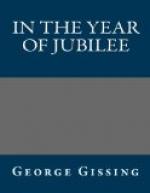The tender memory and pure resolve did not long possess her. They soon yielded before the potency of present evil, and for an hour or more she walked along the sordid highway, nursing passions which struck their venom into her heart.
It was one of those cold, dry, clouded evenings of autumn, when London streets affect the imagination with a peculiar suggestiveness. New-lit lamps, sickly yellow under the dying day, stretch in immense vistas, unobscured by fog, but exhibit no detail of the track they will presently illumine; one by one the shop-fronts grow radiant on deepening gloom, and show in silhouette the figures numberless that are hurrying past. By accentuating a pause between the life of daytime and that which will begin after dark, this grey hour excites to an unwonted perception of the city’s vastness and of its multifarious labour; melancholy, yet not dismal, the brooding twilight seems to betoken Nature’s compassion for myriad mortals exiled from her beauty and her solace. Noises far and near blend into a muffled murmur, sound’s equivalent of the impression received by the eye; it seems to utter the weariness of unending ineffectual toil.
Nancy had now walked as far as Newington, a district unfamiliar to her, and repulsive. By the Elephant and Castle she stood watching the tumultuous traffic which whirls and roars at this confluence of six highways; she had neither a mind to go on, nor yet to return. The conductor of an omnibus close at hand kept bellowing ’London Bridge!’ and her thoughts wandered to that day of meeting with Luckworth Crewe, when he took her up the Monument. She had never felt more than an idle interest in Crewe, and whenever she remembered him nowadays, it was only to reflect with bitterness that he doubtless knew a part of her secret,—the part that was known to Beatrice French,—and on that account had ceased to urge his suit; yet at this moment she wished that she had pledged herself to him in good faith. His behaviour argued the steadfast devotion of an honest man, however lacking in refinement. Their long engagement would have been brightened with many hopes; in the end she might have learned to love him, and prosperity would have opened to her a world of satisfactions, for which she could no longer hope.
It grew cold. She allowed the movements of a group of people to direct her steps, and went eastward along New Kent Road. But when the shops were past, and only a dreary prospect of featureless dwellings lay before her, she felt her heart sink, and paused in vacillating wretchedness.
From a house near by sounded a piano; a foolish jingle, but it smote her with a longing for companionship, for friendly, cheerful talk. And then of a sudden she determined that this life of intolerable isolation should come to an end. Her efforts to find employment that would bring her among people had failed simply because she applied to strangers, who knew nothing of her capabilities, and cared nothing for her needs.




